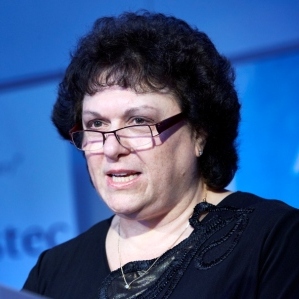
Lifestyle/Community

Alison Katzeff – very capable and knowing what she wants
MOIRA SCHNEIDER
CAPE TOWN
PHOTOGRAPH: ARK IMAGES – SHAWN BENJAMIN
Pictured: Alison Katzeff, chairman of the UJC, addresses this year’s campaign launch.
A seasoned community leader of some 25 years’ standing – it’s easier to ask her which organisations she hasn’t been involved in – she is uniquely qualified for the position. A businesswoman for 39 years, she has the practical know-how, topped off with the prestigious – and notoriously demanding – MBA degree she obtained at UCT some three years ago.
Katzeff puts the decision to enrol for the “hectic” degree down to “a midlife crisis”. Both her children had left for Israel, she had just completed her term of office as chairman of the United Herzlia Schools and she thought: “Okay, I’m finished with the school – now what am I going to do with myself? I hate being bored!”
The topic of her dissertation was “Transition of family businesses to future generations”. And this, she says, translates “very nicely” to the community, which she regards as a family business.
Katzeff feels that women are becoming increasingly involved in decisions, a component of philanthropy’s changing face. In addition, “It used to be that it was something you gave just from guilt and that was the end of your giving.
“Today, the younger generation wants to be involved, we’re giving as couples, we are involved with how we’re giving and what we’re giving to. Young people want transparency – they want to see and touch what they’re involved with – they like projects.”
As a donor herself, Katzeff says she sees every donor with the same eyes that she would like to be seen with. “There’s a certain way you want to be treated,” she begins.
“There’s a respect that’s required – you can’t expect people to give. It’s part of a conversation. Philanthropy is a discussion.
“When somebody comes to me for a donation, I like to have the discussion: ‘What are you doing, what project are you involved in?’ Very important is transparency – all of us today want to see balance sheets and income statements.
“We want to understand what the organisations are doing. We want to understand their expense structures so that we know that most, if not all, of what we are giving is going to where it must go.”
Katzeff has certainly been successful in her efforts, evidenced by the fact that she has been invited to stay on for a second term at the UJC. “I’ve taken a more strategic view,” she explains, “opening it up from just ‘campaigning’ a donor (once a year) to the conversations we can have with the donors.
“Our objective is a fuller offering, trying to impact on categories of donors at specific times. I want to be able to engage over the year.”
Recently, for example, a few donors attended a talk on the taxation of trusts. “So it’s not just a take – we want to be able to give back,” she stresses.
“We’re a very cohesive community, which is extraordinary, and we need to have an offering for everybody.” Obviously a




